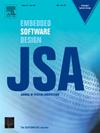Electric vehicle charging network security: A survey
IF 3.7
2区 计算机科学
Q1 COMPUTER SCIENCE, HARDWARE & ARCHITECTURE
引用次数: 0
Abstract
With the rising number of electric vehicles, their charging network has expanded into a vast and intricate system involving multiple stakeholders and numerous charging service entities. It relies on various technologies, such as communication protocols, network connections, and data transmission, leading to the generation of substantial amounts of sensitive data. Ensuring its high security requires the implementation of a comprehensive array of security measures, including stringent identity authentication and access control techniques, cryptographic solutions to safeguard data, and diverse strategies for detecting and countering network attacks. In this article, we present a comprehensive overview of the mainstream architectures and communication protocols in electric vehicle charging networks. We also provide a brief introduction to other protocols used in charging networks and explore the charging infrastructure and its associated security requirements. We examine a charging network’s security challenges at its perception, network, and application layers, and summarize the important solutions proposed in recent literature. Additionally, we delve into privacy security and payment security in the charging business. We investigate the utilization of blockchain technology to safeguard charging networks. Finally, we highlight public safety issues of a charging network and suggest future research directions to steer further studies of charging network security.
求助全文
约1分钟内获得全文
求助全文
来源期刊

Journal of Systems Architecture
工程技术-计算机:硬件
CiteScore
8.70
自引率
15.60%
发文量
226
审稿时长
46 days
期刊介绍:
The Journal of Systems Architecture: Embedded Software Design (JSA) is a journal covering all design and architectural aspects related to embedded systems and software. It ranges from the microarchitecture level via the system software level up to the application-specific architecture level. Aspects such as real-time systems, operating systems, FPGA programming, programming languages, communications (limited to analysis and the software stack), mobile systems, parallel and distributed architectures as well as additional subjects in the computer and system architecture area will fall within the scope of this journal. Technology will not be a main focus, but its use and relevance to particular designs will be. Case studies are welcome but must contribute more than just a design for a particular piece of software.
Design automation of such systems including methodologies, techniques and tools for their design as well as novel designs of software components fall within the scope of this journal. Novel applications that use embedded systems are also central in this journal. While hardware is not a part of this journal hardware/software co-design methods that consider interplay between software and hardware components with and emphasis on software are also relevant here.
 求助内容:
求助内容: 应助结果提醒方式:
应助结果提醒方式:


